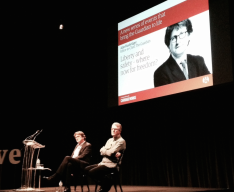Guardian editor-in-chief questions new government terror laws
The editor-in-chief of The Guardian Alan Rusbridger has questioned whether new Australian laws designed to clampdown on whistleblowers would have seen him facing jail for revealing Australia’s phone tapping of the Indonesian president.
Last year The Guardian published a story gleaned from the leaked Edward Snowden files on US intelligence operations which claimed Australian officials had been tapping the phone on the Indonesian president and his wife.
Recently the Government passed anti-terrorism laws which take away from journalists the right to a public interest defence when publishing material about national security, which could see journalists forced to give up their sources and be jailed, even if a story were true.
Speaking in Sydney last night on the issues raised since the publisher first started airing allegations arising from the Snowden leaks, Rusbridger questioned whether the new laws would have seen him and then editor Kath Viner jailed for the Indonesian story.
His question was answered by MC David Marr after the lecture, who told him on stage before a Q&A: “Alan I can answer your question as to whether you would have been prosecuted were the special interest law in place when you published. The answer is yes. Because (Attorney General) Senator Brandis was asked several times and he point blank refused to use the most useful word, which is no.”
In a wide-ranging lecture on the future of privacy Rusbridger said he felt it was ” a good deal easier” to publish the Snowden revelations from the US rather than the UK as there is no prior restraint, which he described as a “posh word for censorship”. “That allows a much more reasonable discussion to take place in advance of publishing,” he said.
On his decision to allow the British government into the Guardian’s London offices to destroy computers, he said “when the government came to the Guardian and made us smash up our hard disks it was almost a point of principle to keep on publishing,” adding he would “rather do that than get into a three year multimillion pound battle with the British government through the courts”.
He also said many journalists, especially in the UK, had not taken the Snowden revelations, and the implications that governments had been surveilling people, seriously until it emerged the British police had been monitoring phone records of journalists from The Sun and The Times, both owned by Rupert Murdoch’s News Corp.
Asked by a member of the audience how journalists in Australia could make potential whistleblowers feel more secure in the wake of the new laws, Rusbridger acknowledged “it is a huge issue”.
“It goes back to the question to the complacency with which some journalists viewed these revelations until it started happening to them, and the thought that as journalists it would be impossible to communicate with sources without that being known.”
He added: “Any journalist and media organisation who is not doing encryption and telling sources how to get in touch with them securely is going to be at big risk.”
Alex Hayes




